
Job interviews provide an opportunity for both employers and applicants to get a sense of whether the position, work environment, organizational culture, and objectives would be a good match.
We’ve rounded up the top interview templates for employers, including schedule and question templates, an exit interview template, and scorecards for final evaluations. Templates are available for free download in Excel, Word, PDF, and Google formats.

Download Interview Agenda Template
This agenda serves as an interview itinerary template: It breaks down each portion of the interview process into clear steps, identifies who is responsible for each step, and provides a timeline to follow. For group interviews or lengthy agendas, it can be helpful to create an organized outline so that everyone involved in the process is aware of the interview format. Modify the template to create an agenda that suits your organization and the role you are filling.
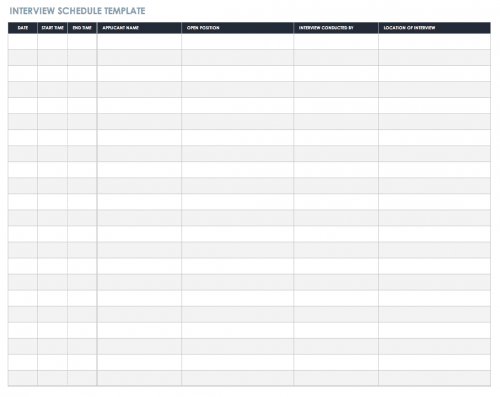
Download Interview Schedule Template
Create a schedule to keep track of interviews with multiple candidates. This interview scheduling template can also be used to coordinate several activities for one applicant, such as interviewing with multiple individuals or teams, offering a presentation, or attending other events as part of the interview process. To modify the template, simply edit the headings of each column on the spreadsheet for a customized schedule.
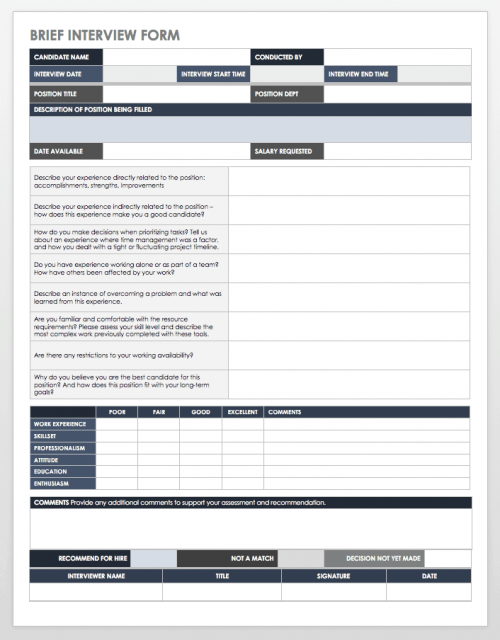
Download Brief Interview Form Template
This job interview form covers the basics on a single page, with room for questions, a brief evaluation, and notes or recommendations. At the top, add details about the interview, such as the position being applied for, the date and time of the interview, the candidate and interviewer names, and any other details you want to track. Use the template as a guide to create your own condensed interview form.
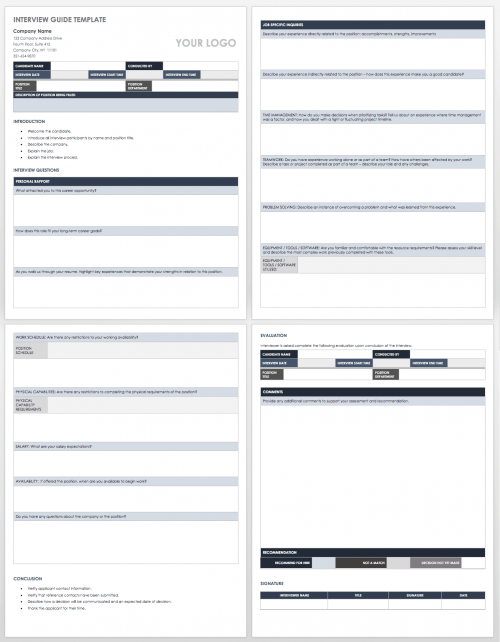
Download Interview Guide Template
An interview guide template can walk interviewers through the steps of introducing candidates to the interview process, asking pre-planned questions, evaluating responses, and rating candidates to help decide whether they should move on to the next step toward being hired. Use this template as an outline to create your own guide, and add a script for interviewers to follow, information that is relevant to the position, and specific questions to determine applicant qualifications. The template includes a basic evaluation scorecard and rating scale as well as room for comments or recommendations.
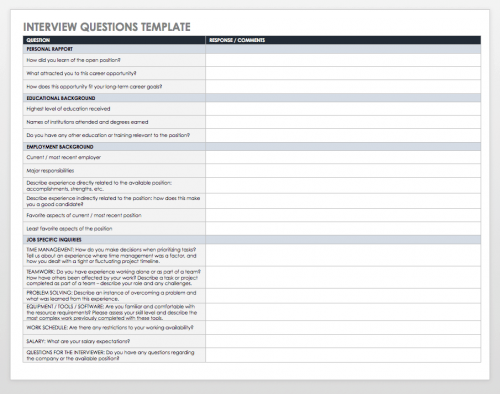
If you need ideas for questions to ask during an interview, use this template as part of your brainstorming process. Candidates can also use this template as a practice guide for answering interview questions. The template includes sample questions aimed at gathering information about a range of skills and qualities. Adjust the questions to fit a specific role, industry, and type of interview.
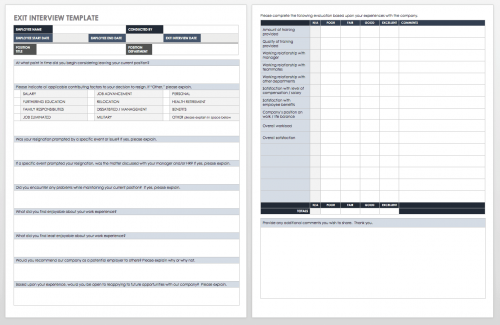
Download Exit Interview Template
Exit interviews are an opportunity for employers to gather information about an employee’s work experience, including feedback on what elements of a job or an organization might need improvement. This template provides a survey for employees who are leaving a job, with questions related to the reason for ending employment, experience at the company, and satisfaction with the job. As with the other templates on this page, the template can be tailored to fit the needs of your human resources department.
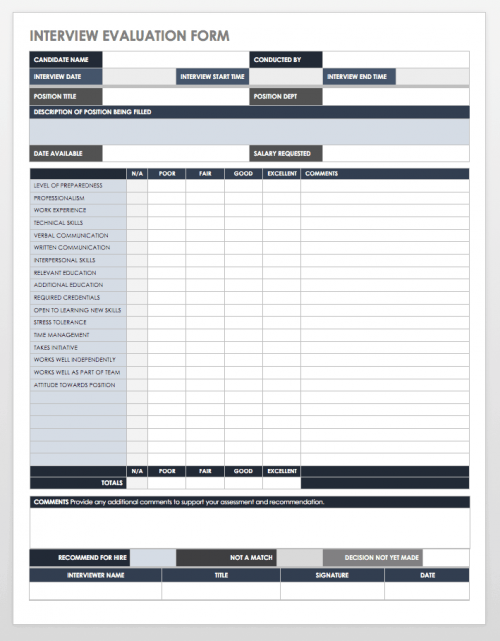
Download Interview Evaluation Form Template
List the core skills and credentials required for a position, along with other qualities that you want to rank, such as communication style, preparation for the interview, or initiative. Evaluate a candidate by assigning a score to each item based on how well they meet the requirements. The template includes a rating scale to indicate whether a competency was absent, average, or excellent. You may also want to include notes to record why you gave a certain score.
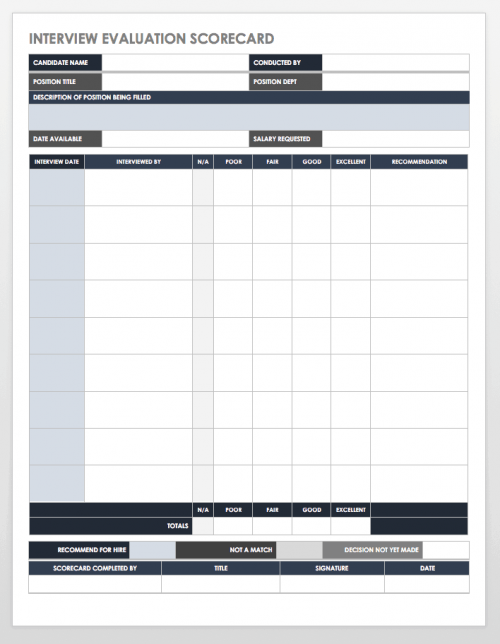
Download Interview Evaluation Scorecard Template
After completing an evaluation form and assigning scores to indicate how a candidate ranks for each requirement, use this scorecard template to add up overall scores and get a quick overview of results. It can also be used to calculate average scores and see how many items received high or low scores. Add notes to support the decisions and recommendations based on the data collected.
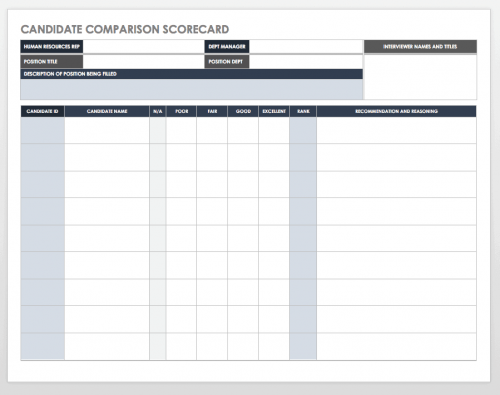
Download Candidate Comparison Scorecard Template
Once candidates have been ranked for interview performance, relevant experience, skills, and other factors, you can compare their scores to those of other applicants. This scorecard shows the candidates side by side, along with overall ratings to help you decide which candidates will move on to the next part of a hiring process. Include interviewer names and notes to keep track of each step in making hiring decisions.
Interviews will of course vary widely depending on the type of position that a candidate is applying for, the size and type of the business or organization that is hiring, industry standards or requirements, and other factors. Creating templates for a range of positions, from entry-level to management and executive leadership roles, can help to define the core qualifications needed for a job, create a standardized approach to interviewing and evaluating applicants, and streamline the interview process so that interviewers have clear expectations and procedures to follow. While the content and format of an interview will be shaped by the position, here are some common elements that are typically covered:
Interview questions may also relate to planning and organizational skills, salary expectations, work standards, and the confirmation of or expansion upon information provided in a resume. Interview templates often have a rating scale built in so that interviewers can easily evaluate and score a candidate’s answers, and then assign an overall score based on the results.
According to the Equal Employment Opportunity Commission (EEOC), discrimination is forbidden from every aspect of employment, including steps in the pre-employment process, such as advertising and recruitment for open positions, application requirements for candidates, and what interview questions are asked. In general, it’s important to ask only for information that will be used to make a hiring decision. That means avoiding topics related to gender, race, family status, age, disability, or pregnancy. Interviewers may need training in order to fully understand what types of questions could violate labor laws. A question that is intended to be friendly or personable may actually be interpreted as fishing for information that could be used in a discriminatory manner.
Behavioral interview questions focus on how a candidate handled past situations in order to get an idea of how they would perform in the position they are applying for. The questions are designed to get specific, real-world examples of past behavior in work situations. Due to their focus, they are sometimes called STAR interview questions (specific situation, the task required, actions taken, and results). Behavioral questions may illustrate how a candidate is likely to react in a given situation and provide examples of interpersonal and time-management skills. The examples that a candidate chooses to share may reveal what they find challenging or difficult. Behavioral questions may also offer opportunities to discover what a candidate has learned from previous challenges. Here are three examples of behavioral interview questions:
Situational interview questions are similar to behavioral ones, but rather than focusing on past experiences, the interviewer offers a hypothetical scenario and asks the candidate to describe how they would deal with that situation. This can be useful for identifying how someone might handle the responsibilities of a particular job, how they might deal with problem-solving challenges, and their overall level of expertise. Situational questions might include the following:
Both behavioral and situational questions ask candidates to consider various scenarios, but behavioral questions focus on past experiences, while situational ones look to how something might be handled in the future. Most interviews include a combination of both approaches, along with general questions related to background and competencies.
Using a scorecard to evaluate an interview provides a standardized and efficient method for ranking candidates. This method helps ensure fairness when comparing various applicants because everyone’s scores are based on the same factors. A scorecard can also be a helpful tool for comparing how different interviewers rate the same candidate. In addition, having a standardized scoring system may also provide some protection for a business if a candidate claims that they were judged unfairly or the outcome was swayed by the interviewer’s bias. Filling out an evaluation scorecard creates documentation to support hiring decisions and protect against claims of bias. Finally, another benefit of a scorecard is that it can highlight the core competencies required for a position, so important qualifications won’t be overlooked, and candidates will be evaluated based on specific requirements.
Taking time to train interviewers on how to use evaluation forms and scorecards can also help the interview process go smoothly and encourage accuracy and consistency. Make sure any questions are cleared up before interviewing begins.
Just as businesses need to define their interview objectives and understand how certain questions will help determine a hiring decision, candidates need to prepare for being interviewed. One of the most important things to keep in mind when answering interview questions is to use specific examples to illustrate your experience and abilities. Here are a few other tips to consider:
Going to job interviews can feel daunting, but advance preparation and practice can help the process go more smoothly. Read sample interview questions, and enlist a friend to help you practice your answers.
Empower your people to go above and beyond with a flexible platform designed to match the needs of your team — and adapt as those needs change.
The Smartsheet platform makes it easy to plan, capture, manage, and report on work from anywhere, helping your team be more effective and get more done. Report on key metrics and get real-time visibility into work as it happens with roll-up reports, dashboards, and automated workflows built to keep your team connected and informed.
When teams have clarity into the work getting done, there’s no telling how much more they can accomplish in the same amount of time. Try Smartsheet for free, today.